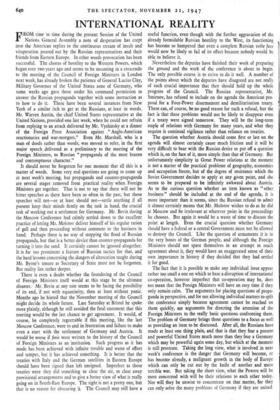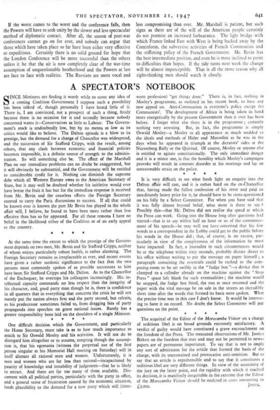INTERNATION4L REALITY
FROM time to time during the present Session of the United Nations General Assembly a note of desperation has crept into the American replies to the continuous stream of insult and vituperation poured out by the Russian representatives and their friends from Eastern Europe. In other words provocation has been successful. The chorus of hostility to the Western Powers, which began over two years ago and seems to be mounting in a crescendo to the meeting of the Council of Foreign Ministers in London next week, has already broken the patience of General Lucius Clay, Military Governor of the United States zone of Germany, who some weeks ago gave those under his command permission to answer the Russian propaganda together with some instruction as to how to do it. There have been several instances from New York of a similar itch to get at the Russians, at least in words. Mr. Warren Austin, the chief United States representative at the United Nations, provided one last week, when he could not refrain from replying to an attack delivered by Mr. Vyshinsky at a dinner of the Foreign Press Association against " Anglo-American reactionaries and war-mongers." Even Mr. Marshall, who is a man of deeds rather than words, was moved to refer, in the first major speech delivered as a preliminary to the meeting of the Foreign Ministers, to Russian " propaganda of the most brazen and contemptuous character."
It should never be forgotten for one moment that all thiS is a matter of words. Some very real questions are going to come up at next week's meeting, but propaganda and counter-propaganda are several stages removed from practical reality when Foreign Ministers get together. That is not to say that there will not be bitter speeches as there have been so often in the past, but those speeches will not—or at least should not—settle anything if all present keep their minds firmly on the task in hand, the crucial task of working out a settlement for Germany. Mr. Bevin during the Moscow Conference had calmly settled down to the excellent practice of letting Mr. Molotov deliver himself of his regular ration of gall and then proceeding without comment to the business in hand. Perhaps there is no way of stopping the flood of Russian propaganda, but that is a better device than counter-propaganda for turning it into the sand. It certainly cannot be ignored altogether. It is far too prominent a feature of Russian tactics for that, and the hard lessons concerning the dangers of altercation taught during Mr. Byrne's tenure as Secretary of State must not be forgotten. But reality lies rather deeper.
There is even a doubt whether the foundering of the Council of Foreign Ministers itself would at this stage be the ultimate disaster. Mr. Bevin at any rate seems to be facing the possibility of its end, if not with equanimity, then at least without panic. Months ago he hinted that the November meeting of the Council might decide its whole future. Last Saturday at Bristol he spoke more plainly, although he still avoided the fatal statement that this meeting would be the last chance to get agreement. It would, of course, be completely regrettable if this meeting, like the last Moscow Conference, were to end in frustration and failure to make even a start with the settlement of Germany and Austria. It would be worse if finis were written to the history of the Council of Foreign Ministers as an institution. Such progress as it has made has been achieved with infinite trouble and waste of effort and temper, but it has achieved something. It is better that the treaties with Italy and the German satellites in Eastern Europe should have been signed than left unsigned. Imperfect as those treaties were they did something to clear the air, to clear away provisional arrangements and to give a better view of what is really going on in South-East Europe. The sight is not a pretty one, but that is no reason for obscuring 4. The Council may still have a useful function, even though with the further aggravation of the already formidable Russian hostility to the West, its functioning has become so hampered that even a complete Russian volte face would now be likely to fail of its effect because nobody would be able to believe it.
Nevertheless the deputies have finished their work of preparing the ground and the work of the conference is about to begin. The only possible course is to strive to do it well. A number of the points about which the deputies have disagreed are not really of such crucial importance that they should hold up the whole progress of the Council. The Russian representative, Mr. Smirnov, has refused to include on the agenda the American pro- posal for a Four-Power disarmament and demilitarisation treaty. There can, of course, be no good reason for such a refusal, but the fact is that these problems would not be likely to disappear even if a treaty were signed tomorrow. They will be the long-term staple of relations with Germany for many years, and what they require is continual vigilance rather than reliance on treaties.
The question whether Austria should come first or last on the agenda will almost certainly cause much friction and it will be very difficult to bear with the Russian desire to put off a question which is, on the face of it, more simple than that of Germany. But unfortunately simplicity in Great Power relations at the moment is not a matter of the practical problems of geography, economics and occupation forces, but of the degree of resistance which the Soviet Government decides to apply at any given point, and she seems to be prepared to be infinitely awkward about Austria. As to the curious question whether an item known as " other business" should be included at the end of the agenda, it is more important than it seems, since the Russian refusal to admit it almost certainly means that Mr. Molotov wishes to do as he did at Moscow and be irrelevant at whatever point in the proceedings he chooses. But again it would be a waste of time to discuss the point at length. Even the crucial question whether Germany should have a federal or a central Government must not be allowed to destroy the Council. Like the question of armaments it is in the very bones of the German people, and although the Foreign Ministers should not spare themselves in an attempt to reach agreement about it, they would have an exaggerated sense of their own importance in history if they decided that they had settled it for good.
The fact that it is possible to make any individual issue appear rather too small a one on which to base a disruption of international co-operation, however imperfect that co-operation may be, does not mean that the Foreign Ministers will have an easy time if they only remain calm. The arguments for placing questions of propa- ganda in perspective, and for not allowing individual matters to split the conference simply because agreement cannot be reached on them quickly, a;e arguments for directing the attention of the Foreign Ministers to the really basic questions confronting them. The problem of Germany brings those questions to a focus as well as providing an item to be discussed. After all, the Russians have made at least one thing plain, and that is that they fear a present and powerful United States much more than they fear a Germany which may be powerful again some day, but which at the moment is still prostrate. Taking the long view, what is involved in next week's conference is the danger that Germany will become, or has become already, a malignant growth in the body of Europe which can only be cut out by the knife of another and more terrible war. But taking the short view, what the Powers will be most concerned with will be their relations to each other today. Nor will they be unwise to concentrate on that matter, for they can only solve the many problems of Germany if they are united. If the worst attneS to the worst and the conference fails, then the Powers will have to seek unity by the slower and less spectacular method of diplomatic contact. After all, the season of post-war conferences cannot go on for ever, and nobody can argue that those which have taken place so far have been either very effective or expeditious. Certainly there is no solid ground for hope that the London Conference will be more successful than the others unless it be that the air is now completely clear of the war-time assumption of unquestionable brotherhood and the Powers at last are face to face with realities. The Russians are more vocal and less compromising than ever. Mr. Marshall is patient, but such signs as there are of the will of the American people certainly do not promise an increased forbearance. The light bridge with which France linked East with West is being hacked away by the Cominform, the subversive activities of French Communists and the stiffening policy of the French Government. Mr. Bevin has the best intermediate position, and even he is more inclined to point to difficulties than hopes. If the tide turns next week the change will be almost imperceptible. That is all the more reason why all right-thinking men should watch it closely.



































 Previous page
Previous page